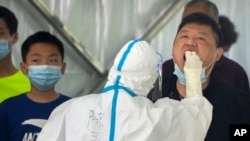Authorities in Beijing have shut down dozens of subway stations as part of its efforts to slow the spread of COVID-19.
The Chinese capital announced Wednesday that it was closing more than 40 subway stations, amounting to about 10% of its system, along with hundreds of bus routes.
Beijing has been on alert since mid-April after 10 middle school students tested positive for COVID-19, sparking widespread panic buying of groceries and other supplies in anticipation of a possible citywide lockdown similar to the one imposed on the financial hub of Shanghai. Authorities have begun a mass testing campaign for most of its 21 million residents, while shutting down schools and businesses, including such venues as gyms and theaters.
Residential buildings in neighborhoods deemed high-risk have also been locked down, leaving streets nearly deserted. Residents in some neighborhoods were already urged to work from home.
China’s national health commission reported 353 confirmed COVID-19 cases on the mainland on Tuesday, including 260 in Shanghai, according to a report in state-run Xinhua news agency. A total of 5,075 asymptomatic cases were reported on the mainland, including 4,722 in Shanghai.
Shanghai continues to struggle to contain a raging outbreak of new COVID-19 cases largely driven by the highly contagious omicron variant, with many of its 26 million residents still under strict orders to remain indoors. The lockdown has led to angry complaints of a lack of fresh food and medicines throughout China’s biggest city.
China has doubled down on its strict “zero-COVID” policy even as it severely disrupts everyday life and brings economic activity to a halt.
Some information for this report came from The Associated Press, Reuters, Agence France-Presse.





